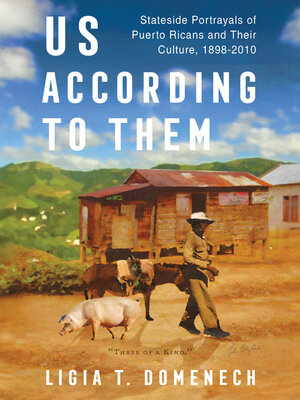Us According to Them
ebook ∣ Stateside Portrayals of Puerto Ricans and Their Culture, 1898-2010
By Ligia T. Domenech

Sign up to save your library
With an OverDrive account, you can save your favorite libraries for at-a-glance information about availability. Find out more about OverDrive accounts.
Find this title in Libby, the library reading app by OverDrive.



Search for a digital library with this title
Title found at these libraries:
| Library Name | Distance |
|---|---|
| Loading... |
The acquisition of Puerto Rico as a colony in 1898 prompted the interest of many in the United States—the military, correspondents, investors, missionaries, politicians, scientists, and tourists. Wanting to know more about Puerto Rico, its inhabitants, and its potential utility, many of these curious but untrained observers visited the island and documented their experiences for the benefit of future visitors. Decades later, readers continue to revisit these writings and create new accounts that explore the "effects of American civilization" on Puerto Rican society.
In Us According to Them: Stateside Portrayals of Puerto Ricans and Their Culture, 1898-2010, Puerto Rican historian Ligia T. Domenech exposes the distorted mirror turned on Puerto Rico, one constructed through the eyes of foreigners. Each of the eighteen chapters focuses on a different aspect of mainland US descriptions of Puerto Rican culture—from gender, race, and class to music, religion, and food. Accurate or not, books on Puerto Rico have contained perceptions about Puerto Ricans and their world that continue to shape opinions held by US citizens dwelling stateside. This book explores the lasting impacts of these repeated stereotypes on the collective understandings of both the colonizer and the colonized.
In Us According to Them: Stateside Portrayals of Puerto Ricans and Their Culture, 1898-2010, Puerto Rican historian Ligia T. Domenech exposes the distorted mirror turned on Puerto Rico, one constructed through the eyes of foreigners. Each of the eighteen chapters focuses on a different aspect of mainland US descriptions of Puerto Rican culture—from gender, race, and class to music, religion, and food. Accurate or not, books on Puerto Rico have contained perceptions about Puerto Ricans and their world that continue to shape opinions held by US citizens dwelling stateside. This book explores the lasting impacts of these repeated stereotypes on the collective understandings of both the colonizer and the colonized.







